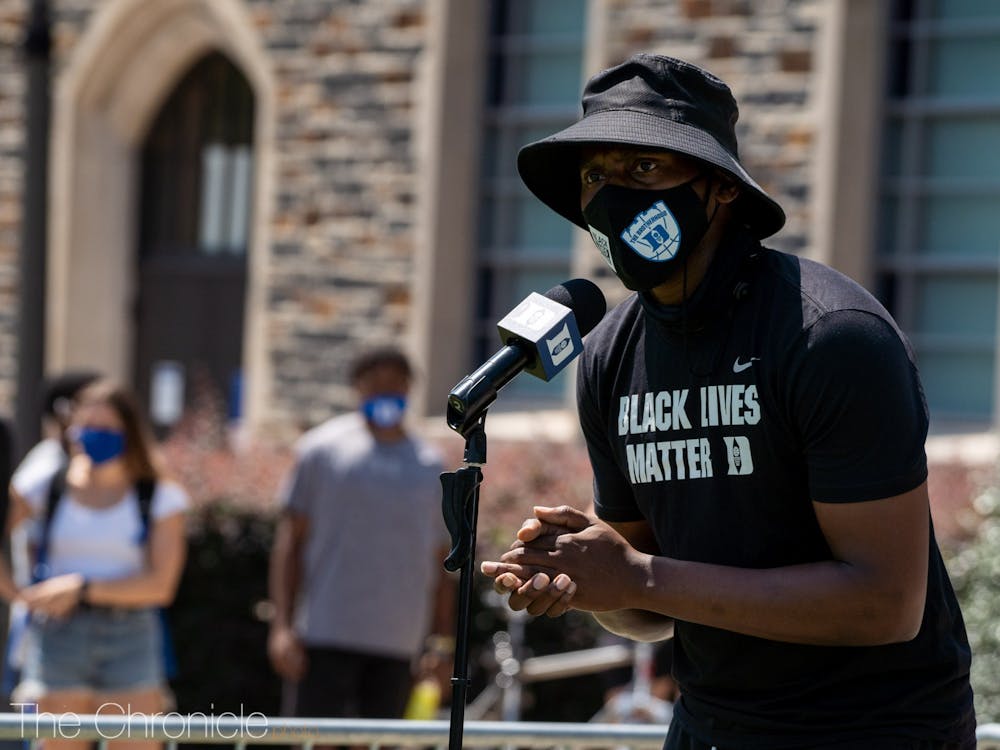For the first time since the Duke vs. North Carolina game this past March, Krzyzewskiville was filled with passionate spectators. However, the passion of these spectators was nothing like the loud, irreverent Crazies we’re used to seeing on that grass. Instead, the hot August wind carried an angry and somber energy.
Hundreds of spectators looked on Thursday afternoon as Nolan Smith, Duke men’s basketball’s director of operations, led a protest in Krzyzewskiville in response to the Kenosha, Wis., police shooting of Jacob Blake. The protest consisted of several speakers, including Duke basketball players, coaches and professors, who addressed the crowd passionately in hopes of inspiring change.
“I can’t change the world,” Smith said. “But goddamnit, I can change Duke while I’m here.”
The first speaker to take the podium after Smith was none other than head coach Mike Krzyzewski. He expressed pride in his players and the greater athletic community for its endurance throughout this tiresome year. His words emphasized the need for listening—not hearing—and peaceful demonstration, much like the demonstration he was speaking to. As the most recognizable face at Duke, Krzyzewski’s presence was essential to the potency of the message being presented.
“We can be on one team,” Krzyzewski said. “The Duke Athletics team, and then let it spread to campus and let it spread through Durham.”
While Krzyzewski and women’s basketball head coach Kara Lawson gave eloquent and informative speeches, those words paled in comparison to those of the players.
The first player to take the stage was senior Mike Buckmire. As he took the mic, Buckmire revealed to the audience a sign that read, “Am I Next?” He tried to convey his fear and anger to the onlookers while recognizing that it wasn’t something that can be put into words. Drawing from personal experiences and beliefs, Buckmire’s speech illuminated a perspective that the sports world tends to overlook.
Freshman Henry Coleman III, the final speaker, took it upon himself to leave an impression on the spectators. As his speech progressed, his tone grew harsher and his voice projected further and further across the courtyard. The authority with which he spoke was unlike anything one would expect from a freshman who’s been on campus for less than a month.
More than anyone else, Coleman pushed responsibility onto the spectators. Not only did he unite them in a chant demanding justice and change, but he listed specific actions that anyone can do to promote change, specifically within the context of Duke Athletics.
“Ask y’all players how they’re doing,” Coleman said. “Ask them how they’re feeling. I promise you, they’re feeling some type of way. I promise you that.”
A common theme across all speakers was the necessity for voting and responsibility. To promote that responsibility, tables were set up at the end of the protest, on which laid information on voting and instructions for registration.
Duke is just the latest in a long line of athletic programs taking stands against racial injustice.
Get The Chronicle straight to your inbox
Sign up for our weekly newsletter. Cancel at any time.
On Wednesday, the Milwaukee Bucks boycotted Game 5 of their first round NBA Playoff series in protest. Within hours, every NBA game set for that day had been postponed and soon after, teams from the WNBA, MLB and MLS followed suit.
The unique message surrounding all levels of athletics in the Black Lives Matter movement is the recognition of players as people. This year more than any before it, Black athletes are demonstrating their influence by forcing spectators to recognize their humanity and promoting change from within.

